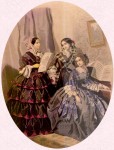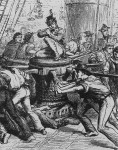 I come from an extremely creative family. My father was an actor, and occasionally liked to pen a word or two; my mother is an artist; my brother is an actor, film maker and musician. My nephew is studying music, and my niece has just finished a design degree. As for me, I write novels and at one time also tread the boards, acting, singing and dancing. I often wonder where all these creative genes came from. Looking at the old occupations of my ancestors, there is nothing to suggest that any of them wrote, painted, acted or made music.
I come from an extremely creative family. My father was an actor, and occasionally liked to pen a word or two; my mother is an artist; my brother is an actor, film maker and musician. My nephew is studying music, and my niece has just finished a design degree. As for me, I write novels and at one time also tread the boards, acting, singing and dancing. I often wonder where all these creative genes came from. Looking at the old occupations of my ancestors, there is nothing to suggest that any of them wrote, painted, acted or made music.
But then, how would we know? The trouble with many creative arts is that unless you are actually earning a living from it, then it often becomes a side-line or hobby. The Victorian occupations of our ancestors that appear in the census records will most likely to be the trade at which they earned their living. For the vast majority of people the need to feed your family was paramount, and that meant that you had very little choice but to work at whatever job came your way, or whatever you had been trained to do.
While it may be easier these days to choose your career, the choice of a career within the arts is still the most difficult in which to succeed, and it must have been more so in the past, particularly within the poorer classes – and even in the middle classes children were often expected to follow in a father’s trade. The choice to follow a writing, artistic or acting career would very often have been an act of rebellion, going against the hopes and expectations of ambitious parents. Middle and upper class women had more time – and were usually encouraged to take on creative pastimes such as the piano, but never as a profession – and we will not find evidence of these genteel arts unless we are very lucky.
succeed, and it must have been more so in the past, particularly within the poorer classes – and even in the middle classes children were often expected to follow in a father’s trade. The choice to follow a writing, artistic or acting career would very often have been an act of rebellion, going against the hopes and expectations of ambitious parents. Middle and upper class women had more time – and were usually encouraged to take on creative pastimes such as the piano, but never as a profession – and we will not find evidence of these genteel arts unless we are very lucky.
My own ancestors range from the poorer working classes up to self-employed tradesmen of the lower/middle middle classes. They all seem to have worked very hard to make a living (our current family definitely owe our work ethic to them), and even if they did hanker after some other form of creative expression, would very likely have had very little time in which to do so. The nearest any of my family come to a creative profession, as far as census occupations go, is in my father’s line, where there are some carpenters, joiners and builders. I am rightfully proud of those ancestors, and very noble professions they are too, but where did my literary genes come from? – because I really do believe that these skills and talents come down through our families.
To look for evidence of creative leanings, one needs to look further afield than the census. There may be clues to be found in other resources. Who, I wonder, penned these lines from my 4 x great-grandfather Samuel Bott’s gravestone:
Here age and youth alike together lie,
Which shows that [we] should be prepared to die
Therefore… death may call full soon
And take your life before you think it noon
It may not be Wordsworth, but somebody took the trouble to write this for the stone that commemorates Samuel, his wife and their young grand-daughter. I like to think it’s a member of the family.
Unfortunately, I have not (yet) found any wills in my family – but if you have an ancestor who wrote or painted, there could be references in a will to related items which may point to a loved pastime.
It may be worth looking at local newspapers or magazines that were published in the 18th and 19th centuries, where they still exist, to see if your ancestors had their works published in any form.
Music is prob ably the most popular form of creative expression, and most of our ancestors would have had some access to musical outlets in some form or other. My Manx fishermen ancestors no doubt had their fishing songs (there is a beautiful Manx Fisherman’s Hymn which we sang at my dad’s funeral), and perhaps my mysterious American mariner (who went back to Boston and disappears after that) sang the occasional sea shanty.
ably the most popular form of creative expression, and most of our ancestors would have had some access to musical outlets in some form or other. My Manx fishermen ancestors no doubt had their fishing songs (there is a beautiful Manx Fisherman’s Hymn which we sang at my dad’s funeral), and perhaps my mysterious American mariner (who went back to Boston and disappears after that) sang the occasional sea shanty.
As for my mother’s Irish lot – well, surely they were always singing – and perhaps jigging – to the ubiquitous music of the Irish pub? I do hope so! Some of them came from Dublin – a place that has produced a large number of literary geniuses – but these ancestors were factory workers when they came to Manchester. However, we know they did other things. I believe that my mother’s maternal grandfather played cricket with W.G Grace himself! (I love cricket too – is there a cricket gene?) But if they played sport, why not do other things?
With the name McKewan in my ancestry I also like to think that I just might…please…be a distant cousin of the brilliant writer Ian McEwan! It is a fairly common name but….
You may be lucky enough to have ancestors who did earn a living from their art with lots of evidence to prove it. I would love to hear from you if you did. Some of my best friend Clara’s ancestors on her father’s side were musicians who arrived from Prussia in the early 19th century. I’m SO envious! And yes, she is musical. But she is also a writer and, like me, would love to find some literary people in her tree.
Anyway, I think the point of all this rambling is that we should never assume that our ancestors were not creative just because they had non-creative occupations – and we should look out for sources that could provide clues to possible sidelines. It may not be possible – but if you do find anything, it will not only give you a stronger sense of your own identity but provide a deeper insight into your ancestors’ lives and characters.
Please leave a comment if you have writers, artists, musicians or actors in your family tree – particularly if you have found evidence in more obscure sources than the normal types of evidence for old occupations – the more ideas the better!


I have been remarkably fortunate in this regard. My great-great-grandfather had seven children by two marriages. By a remarkable coincidence I managed to trace a descendant of my great-great-aunt who went to live with her elder half-sister and act as nursemaid to her children.
Somewhere along the line the half-sister gave her what I believe is called a “commonplace book”, and it is in my cousin’s possession. This book contains small pieces of poetry (some I think are original, others I’m fairly sure are not), mostly of a fairly exalted religious sentiment. They were written into the book around 1870.
Hi James. Thanks for this. You certainly have been fortunate to have had access to such a wonderful source. It is very rare that we get to see such personal items, which not only gives us an insight into the person, but also of the times. I think it was a popular practice for women (mostly the middle classes) to keep books like this for jottings and scraps – whether of their own invention or copied. The religious element is also very usual for that period. Unfortunately, many of these types of sources have not survived. But I’d be interested to know if the talent for poetry has been passed down in your family?
I’d love to know if anyone else has any items like this.
Ros